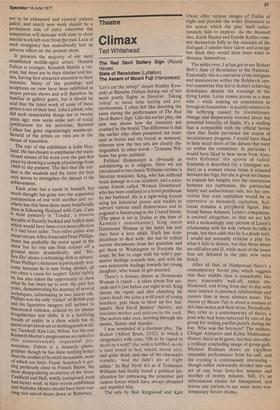Theatre
Climax
Ted Whitehead
The Red Devil Battery Sign (Round House) State of Revolution (Lyftelton) The Ascent of Mount Fuji (Hsmpstead) 'Let's cut the rebop!' shouts Stanley Kowalski at Blanche Dubois during one of her more poetic flights in Streetcar. Taking `rebop' to mean false feeling and pretentiousness, I often felt like shouting the same during the performance of The Red Devil Battery Sign. Like the earlier play, the new one shows how the innocent are crushed by the brutal. The difference is that the earlier play often presented the innocent as brutal and the brutal as innocent, whereas now the two sets are clearly distinguished. In other words — Tenessee Williams has gone political.
Political illumination is obviously as unbalancing as is religion. Here we are introduced to two classic Williams victims: a Mexican musician, King, who has suffered brain damage in a car accident; and a paranoiac female called 'Woman Downtown' who has been confined to a hotel penthouse by her husband. He is a right-wing tycoon using his industrial power and wealth to subvert various small democracies and to engineer a fascist coup in the United States. (The piece is set in Dallas at the time of Kennedy's assassination.) King meets Downtown Woman in the hotel bar and they have a love affair. Each has complications to deal with: she has to collect certain documents from her guardian and get them to Washington to frustrate the coup; he has to cope with his wife's possessive feelings towards him, and with his own possessive feelings towards his young daughter, who wants to get married.
There's a riotous climax as Downtown Woman is raped — it takes about five seconds and is just below our sight-level; King shoots the rapist and dies clutching his (own) head; she joins a wolf-pack of young binnbers, gets them to blow up her husband's 'Red Devil Battery' factory, and becomes mother and mistress to the pack. The wolves take over, howling through the smoke, flames and thunder.
I was reminded of a German play, The Wolves (Alfred Brust, 1922), in which a clergyman's wife cries, 'Oh to be raped to death by a wolf!' Her wish is fulfilled, as she is later found in bed, naked, throat torn, and quite dead; and one of the characters remarks, 'And she didn't die of fright either.' In Red Devil it's as if Tennessee Williams had finally found a political justification for embracing the primitive and violent forces which have always attracted and repelled him.
The sets by Bob Ringwood and Kate Owen offer various images of Dallas at night and provide the wider dimension to the action which the play itself unfortunately fails to explore. As the doomed duo, Keith Baxter and Estelle Kohler commit themselves fully to the excesses of the dialogue; I admire their talent and courage but think they would have been wiser to distance themselves.
The strike over, I at last got to see Robert Bolt's State of Revolution at the National. Essentially this is a narrative of the intrigues and manoeuvres within the Bolshevik central committee that led to Stalin's achieving dominance despite the warnings of the dying Lenin. Lenin comes across as a man who — while making no concessions to bourgeois humanism— is acutely sensitive to the suffering caused by revolutionary change and desperately worried about the potential brutality of Stalin. It's a reading that is compatible with the official Soviet view that Stalin perverted the course of revolutionary progress. I would have liked to hear much more of the debate that went on within the committee. In particular I would have liked to hear more from Alexandra Kollontai: this apostle of radical feminism is described (by a Georgian soldier) as a woman whose brain is situated between her legs, but she is given no chance to express her insights into the connection between sex repression, the patriarchal family and authoritarian rule, nor her conviction that state capitalism would be as oppressive as monopoly capitalism. Kollontai remains a peripheral figure. Her friend Inessa Armand, Lenin's companion, is omitted altogether, so that we are left with a misleadingly cosy picture of Lenin's relationship with his wife (whom he calls a prude, but then adds that he is a prude too). I would not normally criticise a play for what it fails to debate, but that these issues are still alive and ill, while most of the issues that are debated in the play now seem dated.
After all that, at Hampstead there's a contemporary Soviet play which suggests that their middle class is remarkably like ours: reasonably well-off, rather disillusioned, and living from day to day with more interest in personal relationships and careers than in more abstract issues. The Ascent of Mount Fuji is about a reunion of old class-mates and their wives. Periodically they refer to a contemporary of theirs, a poet who had been betrayed by one of the group for writing pacifist poetry during the war. Who was the betrayer? The authors, Chingiz Aitmatov and 'Kaltai Mukhamedzhanov, leave us to guess, but they also offer a brilliant concluding image of group guilt. Michael Rudman draws an excellent ensemble performance from his cab, and the evening is continuously interesting — though rather awkwardly divided into one act of one hour forty-five minutes and another of twenty minutes. Still, it's an adventurous choice for Hampstead, and leaves one curious to see some more contemporary Soviet drama.


































 Previous page
Previous page